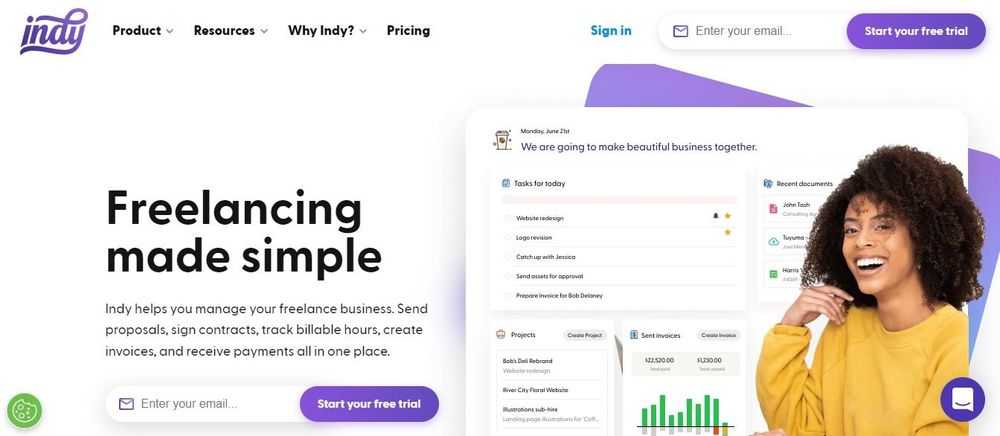Software testing has become a popular career choice and is, since 2017, one of the fastest-growing qualifications in demand.
As a tester, you conduct manual and automated tests to ensure there aren't any bugs or issues within a product. Many become software and QA testers because the salaries are very competitive, and the work tends to be less stressful than that of a software engineer or developer.
Many software testers enjoy working full-time for a company. For others, freelancing is a more feasible and convenient option. However, the question of how to find work testing software as a contractor is not always an easy one. This article will give you some good ideas for succeeding as a freelancer.
What is software testing?
Testing is a part of the quality assurance stage of software development. It usually involves steps such as verifying the requirements of a product, improving its quality, performing risk assessments, and analyzing test results. There are two main types of tests a QA engineer, or software tester performs:
- Automated testing
- Manual testing
Automated testing usually requires some programming skills because you will need to write code to create test cases and write scripts. However, these tests have a significant advantage: They can be run repeatedly without any human intervention (of course, humans create and regularly maintain them). Manual testing can be done anytime and doesn't require any coding. You typically follow steps and take notes of anything that is not happening as expected.
There are also a few different types of tests. These are:
- Unit or component testing: The process of checking small pieces of source code to determine if they are fit for use. These tests are very low level and can be run quickly.
- Integration testing: Also known as I&T, this type of test combines individual software modules (for example, a piece of software and a database) and tries them as a group. It's a common type for evaluating compliance and specified functional requirements.
- Functional testing: More focused on an application's business requirements. These tests verify the output of an action and don't care much for the intermediate states that lead to it.
- Performance testing: They evaluate how a system performs under a certain workload and measure speed, scalability, reliability, etc. For example, you can use this type of test to check response times.
- Acceptance testing: Formal tests that verify if a system is satisfying a business goal. They require an app to be running continuously and focus foremost on what users would do.
- Smoke testing: These basic tests are meant to be quick and give you the assurance that the most basic functions of a product are working as you expect.

What are the typical responsibilities of a freelance software developer?
As a software tester, you will be responsible for the quality of deployment and development of software. You make sure things are fit for purpose by using the tests mentioned above to analyze the product, mitigate risks, and prevent future issues.
Some of the things you will do as a freelance software tester will include:
- Reading and analyzing requirements, use cases, and user stories.
- Executing system, integration, and regression tests.
- Collaborating with other team members like developers and designers.
- Designing automation scripts.
- Detecting and tracking bugs and defects.
- Suggesting solutions and creating documentation.
Benefits of freelance software testing
There are several advantages to working in this field. In particular, software testing has grown in popularity amongst freelancers because it allows them to choose which projects to take and, in most cases, work remotely. The main reasons listed by testers include the following:
There are great career opportunities
Software testing involves many sub-fields; for example, you can specialize in writing automation scripts, performance testing, or business analytics, or work exclusively with a type of mobile application. Once you have gained experience in one testing area, you can try others and see which one fits your goals best. Many companies also offer courses to aspiring testers if you are considering changing careers.
Training is straightforward
Depending on the type of software testing you want to do, learning the different tasks can have a relatively gentle slope. For example, you can master the basics of manual testing in about a month. Of course, becoming an expert in any field takes time, but you can find junior software testing jobs without having all (or even most) of the answers. In many cases, learning how a product works will teach you how to best test it, something for which you can't really plan in advance.
You don't need to be a code ninja
Not all testing roles require testing. Many are product-based and functional, meaning you will be testing things as if you were an end-user. However, technical roles usually benefit from some scripting or programming knowledge, especially if you are going to do any automation or unit testing. You can generally do manual, system, and acceptance testing without having to program anything. Naturally, it's always helpful if you can understand code, as this will also give you a competitive advantage over other freelancers.
Salaries are very competitive
Full-time software testers can aspire to an excellent salary (once you are an expert or if you do automation, six digits are not uncommon). The field is also very dynamic and has been growing consistently for years. Because of this increasing demand, the salaries offered to both software testing employees and freelancers tend to be really good (developers make more, but they are also much more prone to burnout!)
How to find great software testing jobs
Finding freelancing jobs is easy once you know where to look, and software testing jobs are no exception. After all, there is a reason so many QA engineers and testers are turning to contracting.

So, where should you start if you want to find a new job?
Step 1: define your expertise
The first thing you need to do when you begin looking for testing jobs is to find and define your niche. What is it you want to do? Automation testing or manual testing? Unit testing or integration testing? You probably can do more than one thing, but it's likely there is something you are better at - and that interests you. If you want to succeed as a software testing freelancer, keeping motivated can be as important as making a good salary!
Step 2: refresh your skills
Many freelance software testing jobs don't require formal qualifications - just a range of valuable skills you can develop over time. As a contractor, it's vital to be able to handle multiple tasks simultaneously and be able to work without supervision. If you're going to do automation, you should also make sure you remember your languages and tools (yes, it's time to refresh your JavaScript, Python, and Ruby!). In any case, if you've recently graduated and you want to have an edge over others, you can work on your Selenium, Java, or SOA. If recruiters see that you have these skills, they will definitely be interested.
Step 3: pick your device
Even when you know what type of tests you want to do, you might still need to choose a system. It's not mandatory; it's just important if you know you don't want to work with a particular device. For example, are you passionate about web applications? Then perhaps you will only spend time looking at mobile testing. Or maybe you're great at automation or coding; then, you could be thrilled looking for an embedded software or API testing job.
Step 4: write a resume and cover letter
Your resume should include all your work experience and skills. Remember, most interviewers are likely to ask you questions about it, so you should never lie or exaggerate your expertise. At this point, your resume will be the bridge to finding new clients - make sure you read it a couple of times to ensure it includes all the essential information. Nobody likes writing cover letters, but the truth is, they can make a difference when you are applying for a job - especially if you are new and your resume is not fleshed out yet.
Step 5: apply for software testing jobs
You have your resume, and you have your preferences...this means you are ready to start applying for jobs! You can use a regular job board like Indeed or Monster, or try your luck in one of the portals more tailored to contractors. If you are going to use a freelance job website like Upwork, keep in mind you might have to offer reduced prices until you build a reputation. It's also usually easier to find entry work in small companies and start-ups because these businesses are more flexible in their evaluations. Also, if they are just getting started, they will have a lot of things to test.
Step 6: do the work!
If you followed the previous steps and you found a job with which you are happy, it's now time to sit down and do the work. Getting here was important, but so is staying in business. You will want to make sure you always stay on top of all tasks, especially if you are a freelancer. This is why many independent software testers use online platforms to manage all their proposals, contracts, tasks, and invoices.
How Indy can help you
We mentioned motivation as a key to freelancer success. Another critical component? The ability to keep your business working like a well-oiled machine.

Indy is an online platform that makes your life as a freelance or independent software tester easier. This one-stop shop includes nine powerful and integrated tools to help you keep track of your jobs from a single, easy-to-use place. The platform's tools include proposals, contracts, time tracking, calendars, files, chat, invoices, forms, and tasks.
We can help you protect your business, build better client relations, and manage all your tasks from a single location, always available from your computer, tablet, or phone. Start our Free plan today and take full control of your independent business from start to finish. Or upgrade to our Pro Bundle (which includes unlimited advanced features of contracts, invoices, proposals, and tasks, and 1 TB of storage) for just $12 a month.



